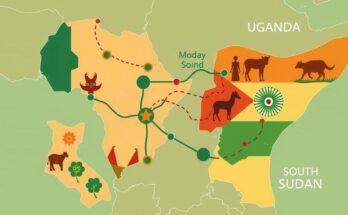The Kenyan government has introduced mandatory DNA testing for mothers returning from abroad with children to address child trafficking concerns. This policy aims to verify biological relationships upon entry into the country and is part of broader support efforts for Kenyans overseas. However, the announcement has faced criticism from some senators regarding the generalization of workers abroad and misleading statements about fatalities.
The Kenyan government has implemented a policy mandating mothers returning from abroad with children to undergo DNA testing. This decision was announced by Labour and Social Protection Cabinet Secretary Alfred Mutua during his appearance at the Senate. The initiative aims to address child trafficking and safeguard the welfare of children entering Kenya.
DNA tests will be conducted at points of entry in the country to confirm the biological link between mothers and their children. This measure is a response to the rising cases involving Kenyan women who have given birth overseas, possibly linked to child trafficking schemes. Mutua remarked on the increasing number of Kenyan nationals who have become mothers abroad and highlighted the importance of these tests in preventing trafficking.
In addition to the DNA testing requirement, the government is actively pursuing the repatriation of these mothers and their children, ensuring adequate support for their return. Mutua expressed the government’s commitment to facilitate a seamless repatriation process for these families.
Moreover, the Labour CS discussed the government’s efforts to support Kenyans facing difficulties while working abroad. Emergency reporting tools, including accessible phone numbers, have been made available through the Ministry of Foreign Affairs and the Ministry of Labour. This initiative aims to provide immediate assistance to those in distress.
Mutua also mentioned plans to enhance support for Kenyan workers overseas by deploying new labour attachments in key countries, such as Saudi Arabia, Qatar, Switzerland, the UAE, and Germany. The planned initiative is expected to cost approximately Ksh 300 million and is set to be executed within the next few months.
However, Mutua’s comments regarding the behavior of Kenyans abroad have led to controversy, with some senators expressing outrage. He cautioned against engaging in activism while overseas, warning that it could result in legal repercussions. This statement was met with backlash from senators who felt it unfairly generalized the behavior of Kenyan workers.
The allegations made by Mutua regarding the deaths of Kenyans abroad were also scrutinized. Senator Godfrey Osotsi criticized the Labour CS for allegedly misleading the Senate by claiming that there were no reports of Kenyan fatalities while working overseas, despite numerous accounts indicating otherwise. The government has yet to respond decisively to these concerning reports.
In summary, the Kenyan government has instituted a mandatory DNA testing policy for mothers returning with children from abroad to combat child trafficking and ensure child safety. Simultaneously, efforts to support Kenyans facing issues overseas include provision of emergency assistance and repatriation initiatives. Despite these positive measures, controversies surrounding the portrayal of Kenyan workers abroad and misleading statements regarding fatalities present significant challenges that the government must address.
Original Source: eastleighvoice.co.ke




